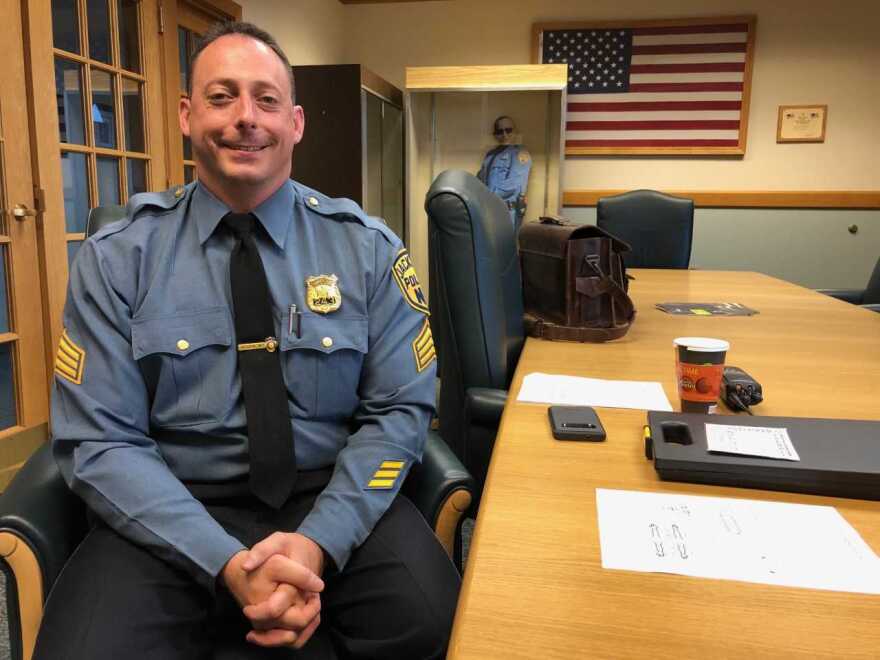Droopy eyelids. Dilated pupils. A racing pulse. More cops in New Jersey will be on the look-out for those symptoms in drivers if the state legalizes recreational marijuana.
State authorities are dramatically increasing the number of police officers trained to spot people under the influence of drugs. But a growing chorus of defense attorneys and criminal justice reformers say the methods these officers use are unscientific and should be banned from the courtroom.
Say you're at a bar … chances are you can spot the people who are drunk.
"When come out, they have that smell, they're stumbling, their falling, they have that smell, they're obnoxious. It's no different than drugs."

Sergeant Mike Kelly is a drug recognition expert … or D-R-E … with the Jackson Township Police Department in Ocean County. He is specially trained to spot the physical signs of somebody who's high. Kelly says traditional lab tests … say blood and urine exams … only show the PRESENCE of drugs in somebody's system. They do not prove that the person is IMPAIRED.
"However when a DRE comes in and we do our 12-step process, we're looking for the impairment of these people."
That 12-step process Kelly is referring to is the methodology used by more than 500 DREs across New Jersey. They have suspects perform field sobriety tests, take their vital signs, examine their eyes and muscle tone, and ask them questions. And Kelly says officers go through extensive training and conduct a series of practice evaluations before they become certified as drug recognition experts. Yet many critics say these drug recognition evaluations are bogus.
"Some people call it junk science. Some people call it nonsense."
Remi Spencer is a New Jersey defense attorney specializing in DWI cases. She says not only are these officers' methods flawed … but also that it's unfair these cops can testify as expert witnesses in court against defendants facing possible jail sentences.
"When the state uses a DRE in a drug DWI case, the defendant is really not getting the benefit of a fair process."
Now … the state is planning to INCREASE the number of drug recognition experts in New Jersey. State Attorney General Gurbir Grewal say they need more of these specially trained cops to combat what could be a surge in drugged driving if New Jersey legalizes recreational marijuana....as legislative leaders and the governor want.

But Kim Schultz … an attorney with the New Jersey public defender's office … warns that drug recognition experts could get it wrong.
"I think that a DRE is basically like a coin flip."
Schultz says certain parts of a drug recognition expert's evaluation are too subjective to be scientific. … and that different officers could reach different conclusions about the same suspect. For example … officers are supposed to feel a suspect's arm to check their muscle tone … but critics say the test is open to interpretation and different muscle tones could be caused by a variety of factors. The specially trained cops can also run into issues when a suspect has taken multiple drugs … because those officers have to interpret varying side effects that could be overlapping.
"We're not talking about putting results into a machine and having the machine spit something out. We're talking about having an officer inject his subjective experiences into the observations of your client."
Vito Abrusci [uh-BRUCE-ee] … a former drug recognition expert and DRE instructor … agrees.
"I think it does have some subjectivity that needs to be cautiously overseen."
Abrusci now consults for defendants facing DWI charges. He says even though officers CAN make mistakes during an evaluation … the drug recognition expert program is still one of law enforcement's best tools to combat drugged driving.
"I still believe in the program, if it's done properly. I think it's important that the roads are safe. I think there's some people on the road that shouldn't be driving."
The debate over drug recognition experts in New Jersey is heating up just as the state's top court prepares to hear a challenge on the scientific merits of the method. The New Jersey Supreme Court is considering the case of a Denville man who was convicted of two DWIs based on the testimony of two different drug recognition experts … despite having no urine or blood test results showing drug use. Kim Schultz … the public defender … hopes the court strikes down the drug recognition expert program once and for all.
"I think it's a dangerous path to go down. And the more subjective power we give to officers, the more dangerous it will be."
Yet backers say without these specially trained police officers, drugged driving would go unchecked. And people like Sergeant Kelly hope the Supreme Court case helps explain their methods more clearly to the public.
"If these defense attorneys or judges sat down and observed what we did, they would understand, hey, this program does work. This is getting people off the road who are dangerous, who have issues, but they're not bad people."
New Jersey has the second-highest number of drug recognition experts in the country … a group that for now is growing larger.



